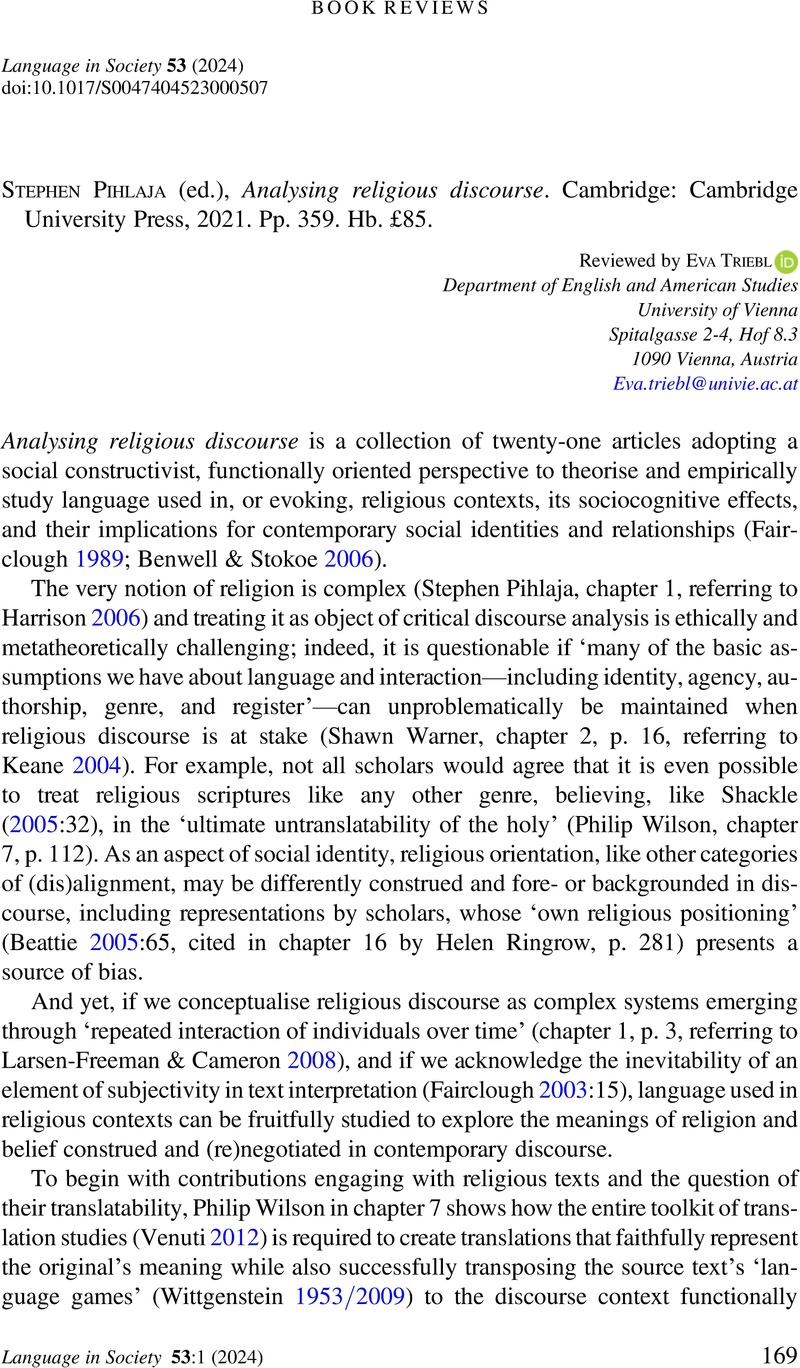No CrossRef data available.
Article contents
Stephen Pihlaja (ed.), Analysing religious discourse. Cambridge: Cambridge University Press, 2021. Pp. 359. Hb. £85.
Review products
Stephen Pihlaja (ed.), Analysing religious discourse. Cambridge: Cambridge University Press, 2021. Pp. 359. Hb. £85.
Published online by Cambridge University Press: 29 August 2023
Abstract
An abstract is not available for this content so a preview has been provided. Please use the Get access link above for information on how to access this content.

- Type
- Review
- Information
- Copyright
- Copyright © The Author(s), 2023. Published by Cambridge University Press
References
Ahearn, Laura M. (2001). Language and agency. Annual Review of Anthropology 30(1):109–37.CrossRefGoogle Scholar
Bamberg, Michael (2009). Identity and narration. In Hühn, Peter, Pier, John, Schmid, Wolf, & Schönert, Jörg (eds.), Handbook of narratology, 132–43. Berlin: Walter de Gruyter.CrossRefGoogle Scholar
Beattie, Tina (2005). Religious identity and the ethics of representation: The study of religion and gender in the secular academy. In King, Ursula & Beattie, Tina (eds.), Gender, religion and diversity: Cross-cultural perspectives, 65–78. London: Continuum.Google Scholar
Bednarek, Monika (2009). Emotion talk and emotional talk: Cognitive and discursive perspectives. In Hanna Pishwa (ed.), Language and social cognition: Expression of the social mind, 395–431. Berlin: Mouton de Gruyter.CrossRefGoogle Scholar
Benwell, Bethan, & Stokoe, Elizabeth (2006). Discourse and identity. Edinburgh: Edinburgh University Press.CrossRefGoogle Scholar
Biernacka, Ewa (2013). The role of metonymy in political discourse. Milton Keynes: The Open University PhD thesis.Google Scholar
Bourdieu, Pierre (1986/2011). The forms of capital. In Szeman, Imre & Kaposy, Timothy (eds.), Cultural theory: An anthology, 241–58. Chichester: John Wiley.Google Scholar
Conradie, Ernst M.; Bergmann, Sigurd; Deane-Drummond, Celia; & Edwards, Denis (eds.) (2014). Christian faith and the earth: Current paths and emerging horizons in ecotheology. London and New York: Bloomsbury.CrossRefGoogle Scholar
Creese, Angela, & Blackledge, Adrian (2011). Separate and flexible bilingualism in complementary schools: Multiple language practices in interrelationship. Journal of Pragmatics 43(5):1196–1208.CrossRefGoogle Scholar
Crenshaw, Kimberlé (1989). Demarginalizing the intersection of race and sex: A black feminist critique of antidiscrimination doctrine, feminist theory and antiracist politics. University of Chicago Legal Forum 1, article 8.Google Scholar
Fairclough, Norman (2003). Analysing discourse: Textual analysis for social research. London: Routledge.CrossRefGoogle Scholar
Fill, Alwin, & Penz, Hermine (eds.) (2018). The Routledge handbook of ecolinguistics. New York: Routledge.Google Scholar
Hallett, Garth (2011). Theology within the bounds of language: A methodological tour. New York: State University of New York Press.CrossRefGoogle Scholar
Hammersley, Martyn, & Atkinson, Paul (1983). Ethnography principles in practice. London: Routledge.Google Scholar
Harrison, Victoria S. (2006). The pragmatics of defining religion in a multi-cultural world. International Journal for Philosophy of Religion 59(3):133–52.CrossRefGoogle Scholar
Herring, Susan (2004). Computer-mediated discourse analysis: An approach to researching online behavior. In Barab, Sasha A., Kling, Rob, & James H. Gray (eds.), Designing for virtual communities in the service of learning, 338–76. Cambridge: Cambridge University Press.CrossRefGoogle Scholar
Hymes, Dell (1996). Ethnography, linguistics, narrative inequality: Toward an understanding of voice. London: Francis and Taylor.Google Scholar
Keane, Webb (2004). Language and religion. In Duranti, Alessandro (ed.), A companion to linguistic anthropology, 431–48. Malden, MA: Blackwell.Google Scholar
Lakoff, George, & Johnson, Mark (1999). Philosophy in the flesh: The embodied mind and its challenge to western thought. New York: Basic Books.Google Scholar
Larsen-Freeman, Diane, & Cameron, Lynne (2008). Complex systems and applied linguistics. Oxford: Oxford University Press.Google Scholar
McNeill, David (1992). Hand and mind: What gestures reveal about thought. Chicago, IL: University of Chicago Press.Google Scholar
Middlebrooks, Anthony, & Noghiu, Alain (2007). Reconceptualizing spiritual capital: A mesomodel for organizational leadership. In Singh-Sengupta, Sunita & Fields, Dail (eds.), Integrating spirituality and organizational leadership, 675–81. New Delhi: MacMillan.Google Scholar
Rosenwein, Barbara H. (2006). Emotional communities in the early middle ages. Ithaca, NY: Cornell University Press.Google Scholar
Shackle, Christopher (2005). From gentlemen's outfitters to hyperbazaar: A personal approach to translating the sacred. In Long, Lynne (ed.), Translation and religion: Holy untranslatable?, 19–32. Clevedon: Multilingual Matters.Google Scholar
Venuti, Lawrence (ed.) (2012). The translation studies reader. 3rd edn. London and New York: Routledge.Google Scholar
Wodak, Ruth (2001). The discourse-historical approach. In Wodak, Ruth & Meyer, Michael (eds.), Methods of critical discourse analysis, 63–94. London: SAGE.CrossRefGoogle Scholar
Wittgenstein, Ludwig (1953/2009). Philosophical investigations. Trans. by Anscombe, G. E. M., Hacker, Peter, & Schulte, Joachim. Chichester: Wiley-Blackwell.Google Scholar





